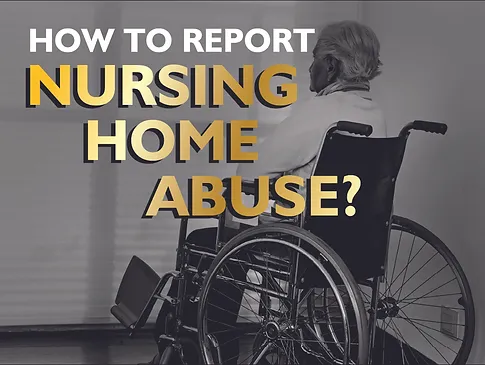If you suspect that an elderly person is being mistreated at the hands of a nursing home caregiver, don’t ignore your instincts. Know how to report nursing home neglect or abuse.
Reporting a Nursing Home for Neglect or Abuse
If you have concerns about nursing home neglect or abuse, you will want to file a report as soon as possible. The Florida Department of Health does not accept complaints about nursing home neglect and abuse over the phone, but they do accept online complaints.
There are numerous steps involved in filing a claim that go beyond just submitting it to the Florida Health Care Complaint Portal, that is why it is strongly that you consult with a personal injury lawyer.
If you or your loved one needs medical care or needs to be taken out of an unsafe environment, our attorneys can help.
What are some definitions relating to elder abuse?
To properly address an incident of elder abuse by a nursing home, there are certain terms and concepts you must understand first. Our accident attorneys have highlighted what those key terms are:
Elder abuse: This includes any act that causes harm or risk to adults aged 60 or older by a person in a trusted relationship such as a caregiver in a nursing home.
Physical abuse: This type of abuse involves physical force against another individual. This can include but is not limited to inappropriate restraint, bodily harm or injury, or causing pain.
Psychological abuse: This type of abuse utilizes verbal or nonverbal acts against an older adult that cause mental pain or distress.
Financial exploitation: This is an inappropriate and illegal use of an older adult’s funds, property, or assets.
Caregiver neglect: The failure to properly care for an older adult.
Abandonment: The desertion of an older adult who is the responsibility of the caregiver.
What are the indicators of elder abuse?
Now that we have a better understanding of the factors involved in nursing home abuse, it is critical to spot the indicators of that abuse. A key sign of this is when your loved one starts to exhibit changes in their behavior or overall mood. During visits, these are things you are going to want to look out for.
Our accident attorneys provided a list of a few other indicators that could point you to the fact that your loved one is experiencing nursing home abuse. Again, the best time to look out for these signs is while on a visit to see them.
Physical abuse: If you notice any bruising in clusters on the body or bruising in irregular parts, such as the back or neck this could point to physical abuse. Other noticeable signs are changes in behavior such as fear, avoidance, nervousness, and anxiety could be an alert to physical abuse.
Psychological abuse: Some indicators of psychological abuse include fear, depression, confusion, and changes in self-esteem or confidence. Emerging thoughts of suicide could also indicate your loved one is experiencing psychological abuse.
Financial exploitation: Sudden changes in spending or banking habits are a typical sign of financial exploitation. Lack of common necessities, transfers, newly authorized account users, or changes in wills or title documents points to financial exploitation.
Caregiver neglect: Bedsores, dirty hair, and clothing, dehydration, malnutrition, unattended health problems, and lack of wheelchairs or walkers are all signs of caregiver neglect.
What are some nursing home abuse statistics?
Nursing home abuse is more common than people think. The statistics show exactly what occurs. The National Center on Elder Abuse (NCEA), reported that roughly 95% of nursing home residents have been neglected or have witnessed neglect. It’s important to keep in mind that some people because of their fear did not respond at all.
The breakdown of the types of elderly abuse that goes on in some of these nursing homes was reported to the National Center for Victims of Crime as follows:
29% – Physical abuse
22% – Resident-on-resident abuse (physical or sexual)
21% – Psychological abuse
14% – Gross neglect
7% – Sexual abuse
7% – Financial exploitation
These numbers are beyond what most people would think and it’s even sadder to note that only 1 in every 14 cases of elder abuse are even reported to authorities. The novel pandemic made the percentage of elder abuse cases go up by 44%.
That is why it is so important to report nursing home abuse. Getting a personal injury attorney to assist you in making your claim can only assist in ensuring justice is served. Nursing homes are supposed to be places of care in which you leave your loved ones, not one that abuses them.
Can a nursing home in Florida evict a resident?
If you have a loved one that is kicked out of a nursing home facility it can come as a shock. There are numerous reasons your loved one could have been discharged from an assisted living facility but there are some reasons which are not legitimate and illegal.
Some nursing homes favor residents who use Medicare over Medicaid. The reasoning behind this is Medicare pays far higher than Medicaid but only for a short time. When the timeframe for that higher payment expires, some residents are given an eviction notice. This type of discrimination is illegal.
A nursing home must follow protocols when discharging patients to ensure the patient’s safety and ensuring they are properly cared for if their facility can no longer help them.
This is called nursing home discharge planning and notification which is as follows:
The resident and authorized representative must be notified of pending discharge in writing with at least 30 days’ notice. The notice of discharge must include the reasons for the discharge and the steps taken by the assisted living facilities to resolve or address the reasons listed. Emergencies are the only exception to this rule.
The facility has to prepare a summary of the discharged patient’s physical and mental status.
An exhaustive post-discharge plan of care must be given to an authorized patient representative, which outlines alternative arrangements for care and housing. The plan must outline instructions for future caregivers and doctors for follow-up care. The written discharge plan also needs to include the location to which the patient will be discharged. That location must also agree to admission. Furthermore, the plan must include all information on medications, services, therapies, and other care needed by the patient.
The patient and their authorized representative have a right to participate in all aspects of this procedure.
The facility is required to arrange a secure and orderly transfer of the patient’s funds and personal assets.
If the assisted living facilities did not follow these protocols when they discharged your loved one, there might be legal recourse that can be taken. With the help of a skilled personal injury attorney, they can help your loved one gain the compensation they deserve. Most people don’t even understand or know their rights in these situations, which is why having an attorney on your side can help.
When it comes to to reporting a nursing home for elder abuse, sometimes people are conflicted as to when they should report nursing home abuse. While many want to give nursing homes the benefit of the doubt when it comes to abuse and neglect, not reporting it as soon as it is realized. Be wary of the fact that nursing home administrators and caregivers will often attempt to hide evidence of fraud, abuse, and neglect.
If you have any concerns, there is a good chance that these concerns are valid, as it is extremely unlikely that any ongoing issue of nursing home abuse will end on it’s own. Fraud, abuse, and neglect are pervasive in many Florida nursing homes, and far too many residents suffer needlessly.
Consult with an attorney and report elder abuse if the following things happen at the nursing home your loved one is at:
Unexplained physical injuries
Unexplained weight gain or weight loss
Unwanted physical contact of any kind
Verbal or psychological abuse
Excessive bills or unauthorized charges
Missing cash, checks, credit cards, or items of personal property
Bedsores or other evidence of neglect
Periods of isolation or elopement
Inability to communicate with friends or family members
Inadequate access to medications or failure to administer medications
Inadequate access to the restroom or basic hygienic care
What agency oversees nursing home complaints in Florida?
The agency that oversees nursing home complaints in Florida is the Florida Agency for Health Care Administration (AHCA). The AHCA is responsible for regulating and licensing healthcare facilities in Florida, including nursing homes.
If you have a complaint or concern about a nursing home that is committing elder abuse, you can file a complaint with the AHCA. The AHCA investigates complaints related to the quality of care, abuse, and neglect. Their ultimate goal is to protect nursing home patients from this type of poor treatment. The AHCA takes complaints seriously and investigates all complaints thoroughly.
It is important to note that if you have a concern or complaint about a nursing home, it is important to speak up and report it to the appropriate agency. This can help ensure that residents of the nursing home receive the care and treatment they deserve.
Speak with a Florida Nursing Home Abuse Attorney in Confidence
Although there are agencies that handle reports of nursing home abuse in Florida, government investigators are not as committed to you as an elder abuse attorney will be. Hiring an experienced lawyer is essential for keeping yourself and your loved one safe by providing you with options as well as holding the nursing home accountable.
Our nursing home abuse attorneys at Demesmin and Dover Law Firm have the knowledge and resources to investigate your case thoroughly and the tenacity to pursue the full compensation you and your family deserve.
Call us at 866-954-MORE (6673) today for your free consultation.



